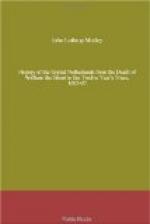John Neyen then departed for Brussels with the form prescribed by the States-General in his pocket. Nothing could exceed the indignation with which the royalists and Catholics at the court of the archdukes were inspired by the extreme arrogance and obstinacy thus manifested by the rebellious heretics. That the offer on the part of their master to negotiate should be received by them with cavils, and almost with contempt, was as great an offence as their original revolt. That the servant should dare to prescribe a form for the sovereign to copy seemed to prove that the world was coming to an end. But it was ever thus with the vulgar, said the courtiers and church dignitaries, debating these matters. The insanity of plebeians was always enormous, and never more so than when fortune for a moment smiled. Full of arrogance and temerity when affairs were prosperous, plunged in abject cowardice when dangers and reverses came—such was the People—such it must ever be.
Thus blustered the priests and the parasites surrounding the archduke, nor need their sentiments amaze us. Could those honest priests and parasites have ever dreamed, before the birth of this upstart republic, that merchants, manufacturers, and farmers, mechanics and advocates—the People, in short—should presume to meddle with affairs of state? Their vocation had been long ago prescribed—to dig and to draw, to brew and to bake, to bear burdens in peace and to fill bloody graves in war—what better lot could they desire?
Meantime their superiors, especially endowed with wisdom by the Omnipotent, would direct trade and commerce, conduct war and diplomacy, make treaties, impose taxes, fill their own pockets, and govern the universe. Was not this reasonable and according to the elemental laws? If the beasts of the field had been suddenly gifted with speech, and had constituted themselves into a free commonwealth for the management of public affairs, they would hardly have caused more profound astonishment at Brussels and Madrid than had been excited by the proceedings of the rebellious Dutchmen.
Yet it surely might have been suggested, when the lament of the courtiers over the abjectness of the People in adversity was so emphatic, that Dorp and Van Loon, Berendrecht and Gieselles, with the men under their command, who had disputed every inch of Little Troy for three years and three months, and had covered those fatal sands with a hundred thousand corpses, had not been giving of late such evidence of the People’s cowardice in reverses as theory required. The siege of Ostend had been finished only three years before, and it is strange that its lessons should so soon have been forgotten.
It was thought best, however, to dissemble. Diplomacy in those days— certainly the diplomacy of Spain and Rome—meant simply dissimulation. Moreover, that solid apothegm, ‘haereticis non servanda fides,’ the most serviceable anchor ever forged for true believers, was always ready to be thrown out, should storm or quicksand threaten, during the intricate voyage to be now undertaken.




